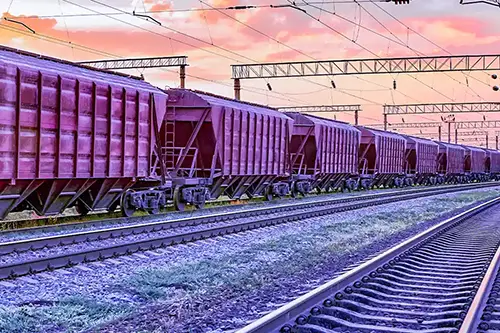Sulfur Supply
- Sulfur is a chemical element that occurs naturally in the earth and is extracted from mines. This element has a wide range of applications and physical properties.
- Types of sulfur include raw sulfur (sulfur), refined sulfur, and liquid sulfur. Each type has its own specific characteristics and uses.
- Raw sulfur or sulfur, as one type of sulfur, is found in mines in raw form and without refining. Its main use is in the production of fertilizers, chemicals, and various industries .
- Refined sulfur, mainly produced from raw sulfur, is used as an additive in industries such as rubber, plastic, water heaters, and floor coverings.
- Liquid sulfur, available in sulfur solutions, is used in industries such as oil and gas, paper production, and detergents.
- Proper packaging of sulfur is crucial as it directly affects the quality and protection of the product. For more information on supply and international transportation, contact us at 09158186856. Suitable packaging should meet physical (resistance to impact and pressure) , chemical (non-interference with substances), and protective (moisture and contamination protection) aspects.
- Sulfur packaging is usually done in plastic bags, metal barrels, or standard containers. The choice of packaging depends on the type and volume of the cargo and different transportation conditions.
- In the transportation of bulk sulfur, the use of appropriate transportation means such as suitable containers, vehicles, and ships equipped with protective systems is necessary.
- Sulfur supply as a raw material in various industries requires collaboration with reputable suppliers, obtaining necessary permits, and assessing their qualifications and quality.
Transportation of sulfur is a sensitive process that requires expertise and precision. Since sulfur is sensitive to moisture and contamination, adhering to appropriate transportation conditions is essential. Baraman Tarabar Company provides rail, road, sea, and air services. For more information on supply, contact Barman Tarabar and our experts at 09158186856.
Proper packaging of sulfur during transportation is very important. Sturdy and waterproof boxes, bags, and barrels are used to protect sulfur from moisture and contamination.
In international sulfur transportation, compliance with international laws and regulations such as IMDG codes for transporting hazardous materials is required.
To protect sulfur during transportation, the use of special equipment and tools such as waterproof-covered containers and air conditioning systems may be necessary.
In terms of time, sulfur transportation can be time-consuming. This could be due to international transportation constraints, terminal stages, and compliance with security regulations.
There are specific requirements for registering and sending sulfur transportation documents. This includes permits, certificates, and export and import documents.
Export and import markets for sulfur in Iran and the Middle East region:
- Export and import market for sulfur in Iran: Iran is one of the largest producers and exporters of sulfur in the world. The sulfur industry in Iran is considered an important and strategic industry. Sulfur is exported from Iran to various destinations, including Middle Eastern countries. Due to domestic industry needs and high sulfur consumption in Iran, imports of this substance also occur. Sulfur imports to Iran are usually done from other parts of the world.
- Factors affecting the sulfur export and import market: Various factors can influence sulfur trade. For example, sulfur price, quality, competition with other countries, transportation constraints, and export and import regulations are factors considered by logistics and supply experts. For more information in this area, simply contact our transportation consultants at Baraman Tarabar Company.
Types of Fertilizers
Different types of fertilizers can vary in terms of chemical composition, production methods, and applications. Here, we will highlight some types of fertilizers and their supply methods:
- Organic Fertilizers: This type of fertilizer is produced from natural sources such as animal manure, plant-based fertilizers, and compost. It can be supplied through domestic production or imports. Organic fertilizers serve as a nutritional source for soil and plants, contributing to their optimal growth.
- Chemical Fertilizers: Chemical fertilizers encompass various chemical compounds that can be derived from natural sources or chemically produced. They include nitrogen, phosphorus, and potassium-based fertilizers. Chemical fertilizers can be produced domestically or imported from various sources.
- Biofertilizers: These fertilizers are produced from biological materials, which can include plant, animal, or microbial sources. The production and supply of biofertilizers have gained industrial attention as a modern trend.
- Irrigation Fertilizers: These fertilizers are dissolved in irrigation water and can be applied through methods such as direct injection or mixing with water. The supply of these fertilizers requires specialized equipment and technologies.
- Organic-based Fertilizers: These fertilizers are produced from organic materials such as animal manure, plant-based fertilizers, compost, and other organic substances. They are highly beneficial for maintaining soil structure and providing suitable nutrition for plants.
Barman Tarabar Company , as one of the major fertilizer suppliers, stands beside esteemed exporters like you to not only provide transportation solutions but also assist with your supply needs.
For procuring fertilizers and related products, simply stay in touch with us.
Petroleum Products
- Procuring petroleum products includes crude oil, diesel, gasoline, fuel oil, petrochemicals, and other derivatives used in industries, transportation, and general consumption.
- These products are typically transported from production centers such as oil fields to various destinations like ports and fuel stations, relying on effective transportation processes.
- Transportation of petroleum products occurs through various means including maritime transportation, rail tank cars, and road transport.
- Incorporating modern transportation methods, such as LNG (liquefied natural gas) shipping for reducing pollutants and improving air quality, can be beneficial.
Should you require services and consultation for procuring and transporting the mentioned goods, feel free to contact us through the provided numbers:
00989158186856

